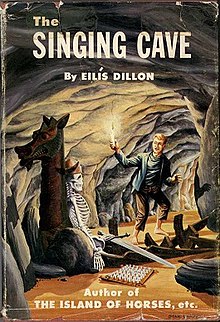 First US edition cover First US edition cover | |
| Author | Eilís Dillon |
|---|---|
| Language | English |
| Genre | Young adult fiction |
| Set in | Connemara |
| Published | 1959 by Faber & Faber |
| Publication place | United Kingdom |
| Media type | |
| Pages | 186 pp |
| OCLC | 43187026 |
| Dewey Decimal | 823.914 |
| LC Class | PZ7.D579 |
The Singing Cave is a 1959 young adult novel by Irish writer Eilís Dillon, first published by Faber & Faber in the UK. It was published the following year in the US by Funk & Wagnalls, illustrated by Stan Campbell.
Plot
Pat, a boy who lives on the west coast of Ireland at Connemara, explores a niche in a cliff that is known locally as "the singing cave". One day, Pat finds the tomb of a Viking warrior in an inner chamber. When he returns the next day the relics have disappeared, but Pat has told nobody about it but his grandfather and Mr Allen, an amateur archaeologist. Pat and his friend Tom Joyce seek to solve the mystery.
Reception
Declan Kiberd wrote, "What Laura Ingalls Wilder did for children's literature in the US, she achieved in Ireland, imparting a sure historical sense in books such as The Singing Cave.
References
- Dillon, Eilís (1960). The Singing Cave. Funk & Wagnalls, OCLC 316814294
- (Nov 6, 1960). 100 other fine books of 1960. Chicago Tribune
- Boston, Howard (May 8, 1960). Teen-Age Stories; Found and Lost. The Singing Cave By Elis Dillon (review). New York Times
- Rahn, Suzanne (1997). Inishrone Is Our Island": Rediscovering the Irish Novels of Eilis Dillon. The Lion and the Unicorn, Volume 21, Number 3, September 1997
- Kiberd, Declan. Obituary. In Eilís Dillon, Richard Kennedy (2006). The Lost Island. New York Review children's collection, ISBN 978-1-59017-205-6
External links
This article about a children's novel of the 1950s is a stub. You can help Misplaced Pages by expanding it. See guidelines for writing about novels. Further suggestions might be found on the article's talk page. |
This article about a young adult novel of the 1950s is a stub. You can help Misplaced Pages by expanding it. See guidelines for writing about novels. Further suggestions might be found on the article's talk page. |